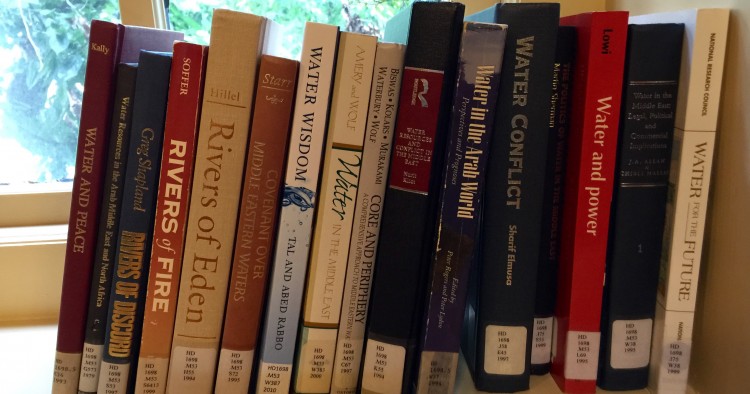For many, an interest in the natural resources of the Middle East begins and ends with oil. However, in a region where systems of agriculture and manufacturing are threatened by increasing desertification and pervasive aridity, the amount, distribution, and control of water is drawing increased international attention.
The issue of water scarcity and control is unique because it pays little heed to geopolitical borders; indeed, it affects both oil-rich and impoverished nations in the region. Because it is not merely a national issue, multilateral and global responses will undoubtedly prove necessary to prevent potential crises.
The study of water resources in the Middle East is not a new issue, evidenced by the fact that The Oman Library at The Middle East Institute has over 55 items in its collection dealing explicitly with the topic, some dating back to 1954. The issue was particularly prominent during the 1960s when Israel diverted freshwater from the Jordan Basin, causing the ire of surrounding Arab states.
Newer interdisciplinary research from environmental science, sustainable development, demographics, and economics analyzes resource scarcity in multidimensional ways. For example, Biswas et al’s Core and Periphery: A Comprehensive Approach to Middle Eastern Water unhinges traditional approaches to conflict resolution by suggesting “hydro-planning for peace,” which incorporates insights from science and engineering to seek solutions. These approaches broaden the category of security from “hard” military and defense issues to encompass water security.
Water in the Middle East: Legal, Political and Commercial Implications, edited by Allan and Mallat, identifies the emergence of international water law, touching on the tangled intersection of international treaties, Shariah law, local customs and traditions, environmental regulations, and commercial and trade law. The volume shows that issues once thought irrelevant to international relations and law, like desalination and groundwater management, have been brought into the mainstream of scholarly study on the Middle East and its peoples.
Some of the works in the collection focus on a specific geographic region, such as Lowi’s Water and Power: The Politics of a Scarce Resource in the Jordan River Basin, which considers the rich history of the area and looks at potential future effects of shortages on residents. Others, like Rivers of Eden: The Struggle for Water and the Quest for Peace in the Middle East, by Hillel, take a broad view of the entire region’s history from ancient civilization to the apparent unrealized potential of water today. Even with such a general approach, Hillel critically assesses the ethical and pragmatic considerations of sharing or trading water resources, inducing rain and runoff, and the desalinization process.
In Rivers of Discord, Shapland offers a comprehensive look at how a seemingly localized, mundane issue has ballooned into an international dispute viewed as vital to the stability of the region. Shapland begins with the central role of water in the Arab-Israeli dispute and proceeds to contextualize the Nile River and the Tigris-Euphrates basin in the history and culture of the region.
For Scholars
Academics, experts, and students will find the sizable collection of water-related resources at the Oman Library to be of great use. For an issue certain to remain of critical strategic, humanitarian, and environmental importance for decades to come, those interested in the region will benefit from the array of historical, economic, and scientific approaches contained in these works. The majority of the relevant volumes are held under the HD1698 Library of Congress classification on the second floor.
Primary Research Applications
- International Law
- Resource Scarcity
- Arab-Israeli Conflict
- Environmental Security
- Middle East History
Texts Cited and Further Reading
Sharif S. Elmusa, Water Conflict: Economics, Politics, Law and Palestinian-Israeli Water Resources (Austin, TX: University of Texas Press, 2007)
Hussein A. Amery and Aaron T. Wolf, editors, Water in the Middle East: A Geography of Peace (Austin, TX: University of Texas Press, 2000)
Arnon Soffer, Rivers of Fire: The Conflict over Water in the Middle East (Oxford: Rowman & Littlefield,1999)
Asit K. Biswas, John Kolars, Masahiro Murakami, John Waterbury, and Aaron Wolf, Core and Periphery: A Comprehensive Approach to Middle Eastern Water (Oxford: Oxford University Press, 1997)
Greg Shapland, Rivers of Discord: International Water Disputes in the Middle East (New York: St. Martin’s Press, 1997)
Miriam Lowi, Water and Power: The Politics of a Scarce Resource in the Jordan River Basin (Cambridge: Cambridge University Press, 1995)
Joyce Shira Starr, Covenant over Middle Eastern Waters: Key to World Survival (New York: Henry Holt & Co, 1995)
J.A. Allan and Chibli Mallat, editors, Water in the Middle East: Legal, Political and Commercial Implications (London: I.B. Tauris, 1994)
Daniel Hillel, Rivers of Eden: The Struggle for Water and the Quest for Peace in the Middle East (Oxford: Oxford University Press, 1994)
Nurit Kliot, Water Resources and Conflict in the Middle East (New York: Routledge, 1994)
The Middle East Institute (MEI) is an independent, non-partisan, non-for-profit, educational organization. It does not engage in advocacy and its scholars’ opinions are their own. MEI welcomes financial donations, but retains sole editorial control over its work and its publications reflect only the authors’ views. For a listing of MEI donors, please click here.













